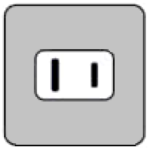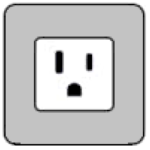Plug For Haiti: What You Need To Know
What is the plug for Haiti? Before you travel, check the information below to make sure your electronic devices are compatible with the outlet type and voltage.
Electrical Summary
Plug Compatibility: Type A, Type B
Voltage: 110V – 120V
Frequency: 60 Hz
Type A

Type B

Can North Americans use Electronics in Haiti without an Adapter?
Yes! North Americans do not need a travel adapter or transformer when traveling to Haiti. Most device plugs will work with the outlet types in Haiti. Also, the voltage in Haiti is the same as in North America.
Please note: an adapter will be needed if your device plug has a grounding pin and you are trying to use a Type A outlet. For this reason, we always recommend traveling with a universal travel adapter.
Can Europeans use Electronics in Haiti without an adapter?
No! Europeans will need an adapter for the outlets and a transformer for the voltage when traveling to Haiti. European device plugs will not work with the outlet types in Haiti. Also, the voltage in Haiti is different from European voltages.
What Outlet does Haiti Use?
Type A

Type A electrical plug sockets are used in North and Central America, including the United States, Canada, and Mexico. They have two flat pins and no grounding pin. These outlets are typically used with devices that have a voltage of 110-120V. This outlet is rated for 15 amps. Plug Type A is compatible with this socket. All other plug types (including Type B) will need an adapter.
Type B

Type B electrical plug sockets are used in North and Central America, including the United States, Canada, and Mexico. They have two round pins and a grounding pin. These outlets are typically used with devices that have a voltage of 110-120V. This outlet is rated for 15 amps. Plug Type A and Type B are compatible with this socket. All other plug types will need an adapter.
Is it safe to drink water in Haiti?
Therefore, it is recommended that visitors to Haiti drink only bottled water or water that has been treated and filtered through a reliable filtration system. It’s also important to avoid consuming ice made from tap water, and to use bottled water when brushing your teeth. In addition, it’s recommended to avoid eating raw fruits and vegetables that may have been washed with tap water.
If you are staying in a hotel or resort, you can ask the staff about the water quality and whether it is safe to drink from the tap. They may be able to provide you with more information and recommendations based on the specific location and conditions.
We recommend always packing a filtered water bottle when traveling:
Travel Essentials
Be sure to check our list of travel essentials before your trip!
Should I get travel insurance when traveling to Haiti?
It is generally recommended to get travel insurance when traveling to a different country. Travel insurance can provide financial protection and peace of mind in case of unexpected events, such as medical emergencies, trip cancellations, lost or stolen baggage, or other travel-related mishaps.
Travel insurance can cover various expenses related to your trip, such as medical expenses, emergency medical transportation, trip cancellation or interruption, lost or stolen baggage or personal belongings, and other travel-related expenses.
Before purchasing travel insurance, it’s important to carefully review the policy details, including the coverage limits, exclusions, and any applicable deductibles or copays. You should also make sure that the policy covers any activities or destinations that you plan to participate in or visit during your trip.
Travel Summary
Haiti is a Caribbean country located on the western part of the island of Hispaniola, known for its vibrant culture, art, and history. The country has had a challenging past, but has recently begun to emerge as a popular destination for adventurous travelers seeking an authentic experience.
One of the most popular attractions is the Citadelle Laferrière, a UNESCO World Heritage Site and the largest fortress in the Americas. Visitors can take a guided tour of the citadel and learn about its history and significance.
Another popular spot is Labadee, a private resort owned by Royal Caribbean that offers visitors a chance to relax on the beach, enjoy water sports activities, and explore local artisan markets.
Haiti’s culture is also a highlight, with vibrant music, art, and cuisine that reflect its African, French, and Caribbean influences. Local dishes such as griot (fried pork), tassot (dried beef), and akra (fried cassava) are must-tries for foodies.
Haiti is also known for its beautiful beaches, such as the stunning turquoise waters of Jacmel and the palm-lined shores of Île-à-Vache. Visitors can also explore the country’s natural beauty through hiking in the lush forests and mountains.
Overall, Haiti is a fantastic destination for those seeking an off-the-beaten-path travel experience with a rich cultural and historical backdrop. With its beautiful beaches, vibrant culture, and unique cuisine, Haiti has become a beloved spot for travelers seeking an immersive and authentic adventure. However, it’s important to note that Haiti still faces some challenges, so travelers should research and take necessary precautions before planning a trip.
Traveling to another country? Check out our Countries page for more info.